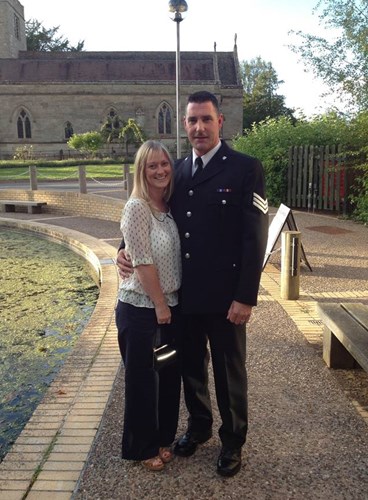'Speak to your nearest and dearest, let them know how you feel’
22 May 2020
A West Mercia Police sergeant has explained how an innocent weekend away to meet up with a friend and ask if he would be Godfather to his children took an unexpected, and unimaginable, turn.
Response Sergeant Pete Frankish, who is based in Worcester, asks: “How could I have ever imagined that my night would end up as it did?”
Speaking out as part of Mental Health Awareness Week which runs until this Sunday, he explains he found out that weekend that he was facing misconduct proceedings.
“This was truly the start of a nightmare which lasted many months and had a huge impact on my mental and physical health, my relationship with my wife, my children, our wider family and even our friendships,” he says.
“At my darkest moments I contemplated suicide, I neglected my health and could not get the investigation out of my mind, it was all-consuming. I had to take some time away from work or it would have broken me.
“If I can take a positive out of the situation, I have faith in the justice system which saw the allegation for what it was and found no case to answer.
“PSD served papers and I relived the whole situation again, feeling that guilty until proven innocent was their stance. I was criticised by the detective inspector for taking a ‘denial’ approach to the allegation; why would I admit to something that I hadn’t done?”
The situation was resolved at a misconduct meeting at which the superintendent ruled no further action was required.
“The relief was palpable. I won’t lie, I shed more than a few tears,” Pete said.
Determined to take a positive from the whole situation to get his world and head back on track, he decided to should share his experience and help others. He joined MIND’s Blue Light peer support group to help other colleagues and has already seen the beneficial effects of offering that support.
“I have shared my story with several other officers now and have found that a problem shared definitely is a problem halved,” he explained
“The feedback I have had from officers I have spoken to is what makes it worthwhile. Some have been in really dark places and on the edge of suicide. Some have wanted to leave their careers behind and walk away with nothing to show but contempt and disdain for the job. But having opened up and spoken about the issues and understood that there is a light at the end of the tunnel, knowing that there will be an end to it, often with less of a sanction than anticipated, is what matters.
“My advice, in a nutshell, speak to your nearest and dearest, let them know how you feel, tell them you love them, let them know what is so upsetting, don’t shut them out. Be honest, look after yourself physically, hug your partner, hug your kids until they let go. Find your happy place - mine was walking my dogs and letting my mind wander to happier times. Don’t listen to rumours, I was honest with my shift and colleagues and told them my story from the start. This stopped any gossiping and I found support in them.
“I would not wish my situation on anyone. That said, I’m stronger than before. I know where my limits are, I know who I can turn to and where my support network is, I also know where it is not! I have built stronger relationships with those I trust and those who were there for me. I can face the world again and look it in the eye. I’ve got just over three years to go and will see my time out doing the job I love. I’ve learnt a lot about the organisation and people as a result of it all.”
Pete has the backing of his wife, Katie, herself a former West Mercia officer, who described the reality of living with him at the time of conduct proceedings.
“We nearly lost our marriage and the children suffered. I saw a massive difference in my husband’s mental and physical health. For example, he would spend many a late evening going over and over the situation, verbally and in his mind,” she explained.
“When he came to bed, he would just be lying awake with the scenario going around and around in his head. He had no appetite and lost well over a stone in weight in a matter of weeks.
“He became impatient through lack of sleep and constant worry. It became a struggle for him to get up in the mornings. After several weeks of being put on a worthless project, he eventually went off sick for a period of time.
“I felt after a while this was not helping with his self-esteem and day to day life. He didn’t want to see anybody or even go out of the house. I suggested he return to work and get some counselling as I feared to leave him alone or allow him out of the house in fear he would end his life.”
And she added: “This wasn’t the man I married and fell in love with. He had lost all his confidence, didn’t want to socialise and even if we did, the investigation became the topic of conversation. It all put a massive strain on our relationship.”
Sarah Cooper, chair of West Mercia Police Federation, said Pete’s case showed the damaging effects of lengthy conduct investigations and welcomed the national Federation’s Time Limits campaign which calls for a cap to be set on the length of time an officer can be subjected to conduct proceedings for.
“Pete is incredibly well respected by his colleagues and has numerous commendations for his bravery and resilience as an operational police officer. His story just goes to show that a decline in mental health can happen to anyone, at any time, and that there can also be a serious impact on family members,” she explained.
“It is clear that any interaction with PSD or the IOPC can be a significant trigger and this is precisely why the Federation has worked with PSD to introduce a meaningful risk assessment questionnaire that should be revisited throughout the investigation in order that any decline can be flagged at the earliest opportunity.
“I am incredibly grateful to both Pete and Katie for being so honest about their experience. If any officer reads this and feels that it has struck a chord then please reach out for help. You are not alone and more colleagues than you could ever imagine will have had their own struggles with mental health. There are full details of support available on our website and it is also important to point out that any family member living in the same household can access mental health support via the Group Insurance Scheme.”
Find out more about Mental Health Awareness Week.





















